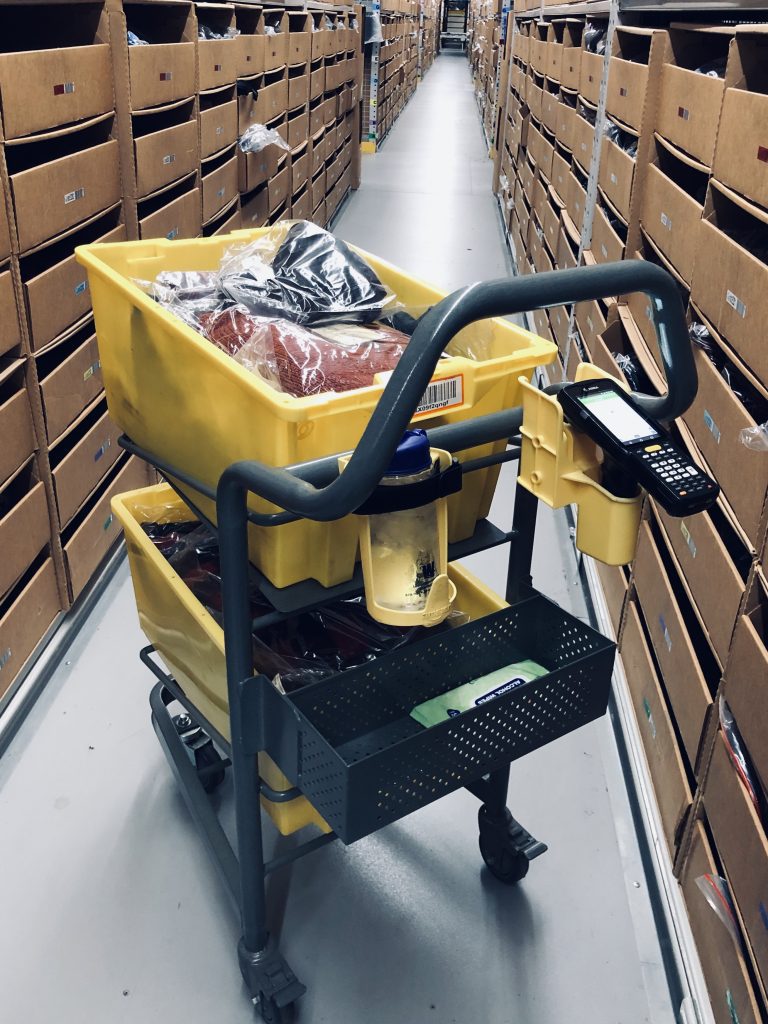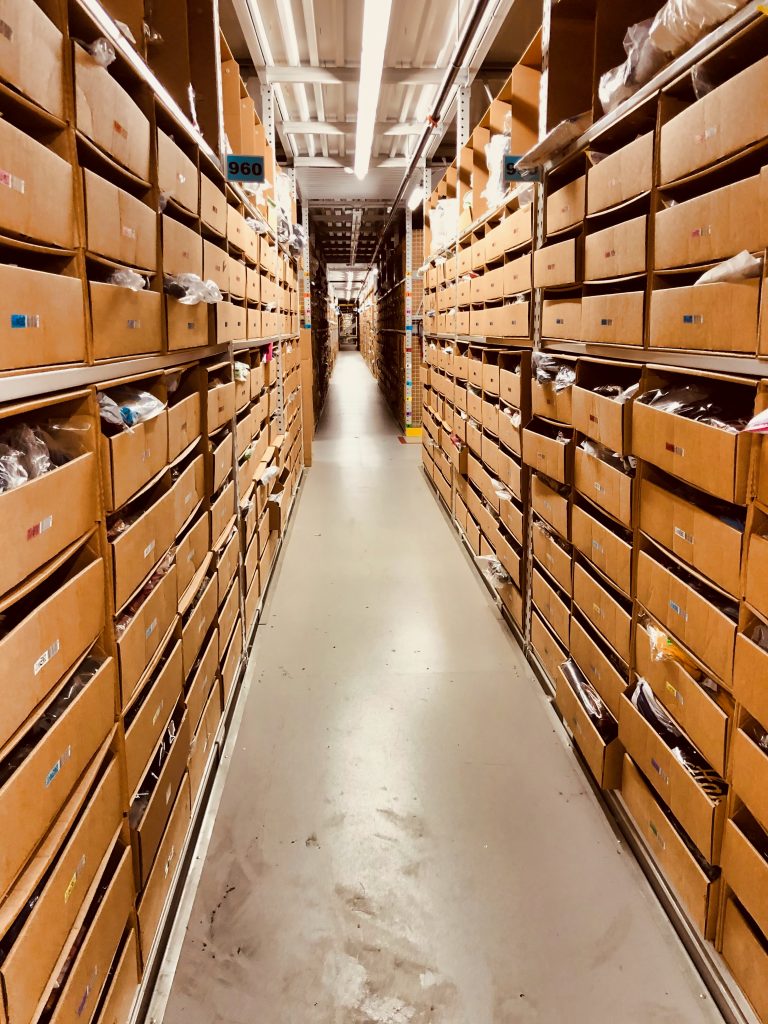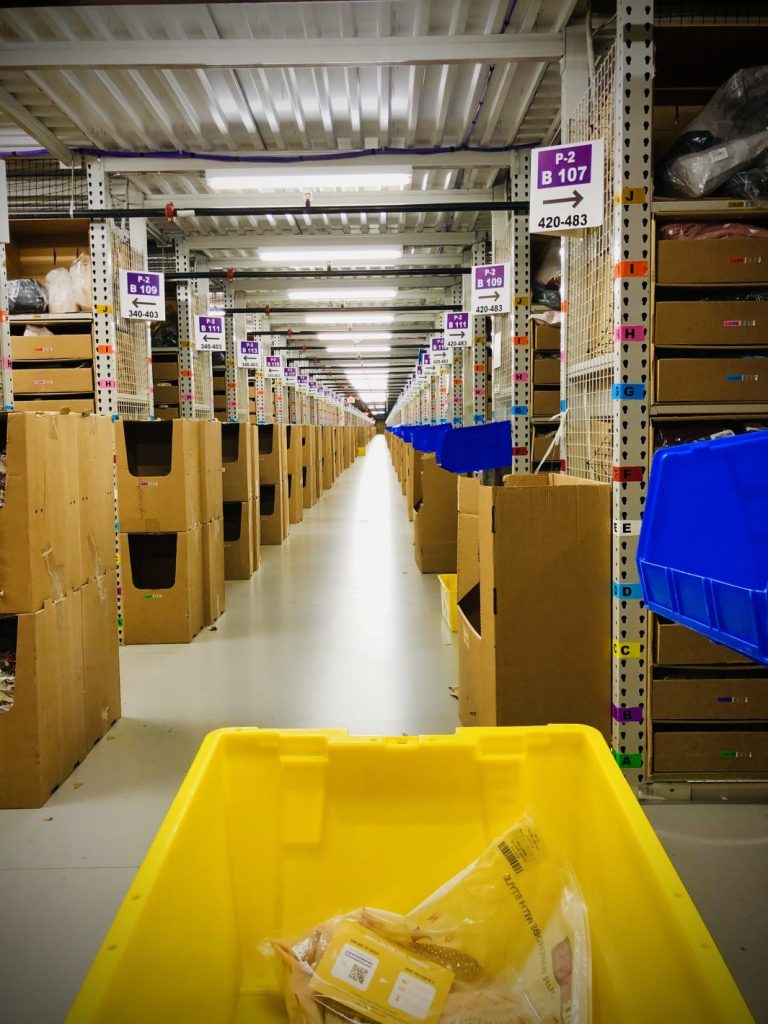After I awoke today, my dreams steamily trailed out of my brain as I shuffled to brush my teeth. The music that woke me was still playing, and I soon found myself moving and grooving to the beat as I picked up the pace and got ready for the day. And while scrubbing my pearly whites and shaking my groove thang, I hatched an idea for Amazon, the world’s most valuable company, to increase their value even more. And most incredibly, an inexpensive, easy, quick, and FUN way to do it. I have to think someone surely has thought of this, but the fact it’s not implemented anywhere makes me doubt it. I’ve run through all the pros and cons and would be happy to discuss any way anyone sees how this idea could fail. I can only see it as a series of huge wins;, not in just one, but several ways. That means you, Andy
Amazon has a bunch of warehouse and distribution facilities they call “fulfillment centers.” The places are generally about the size of a small country and have several thousand workers at each one. The centers are as standardized as possible so if you went into one, you would think you’re at any of them. (And you’d never know what time of day it is.) And there are several activities that go on at the 24/7 centers. They have trucks that constantly bring and take products, that must be unloaded and loaded, people that stock, and people that sort. There are people who package and box and bag items as they come down a conveyor in buckets. Sometimes there are temporary lulls, but usually, the place is running full-speed all the time, as companies and their shareholders want. There are other jobs there of course, but that’s the bulk of the labor and what they do, non-stop (with lawful breaks, of course).
There’s a lot of motion with conveyors running everywhere, and a lot of physical human activity working along them, all throughout the boxes and shelves of the stock area, and with people hurrying along to fix problems that constantly surface.

















As you surely can imagine, some people work more slowly, and some work at a faster pace, and can do so with less/no errors, though. Some people work quickly. And it’s not because of abilities. It’s because they lose motivation and mental and physical initiative and activity while doing such repetitive jobs. Amazon presents a very low barrier to entry for these types of jobs. Most aren’t hired because they fail the drug test. The ones who are hired are usually high-school graduates or young people deciding what they want to do with their lives, and is known for hiring a lot of people who are “offbeat.”
But they’ll hire felons, and anyone, really, if they can just pass (what should be) some simple tests for the warehouse jobs. I’ve taken them, so I know the procedure. And describing their workforce in a general sense isn’t to slam a huge group all at one. Amazon’s lenient hiring policy has helped an army of people get back on their feet, obtain a college degree, and helped countless employees. Amazon is a pretty good corporate citizen, considering how big of a company it is. It’s not JUST Amazon. If you scroll to the bottom of Amazon’s page, you’ll see the many other businesses they own and run, and those don’t represent all the many ones Amazon has bought and absorbed. It doesn’t account for Bezos’ other business, either:
- The Washington Post – the newspaper was bought in 2013 for $250 million
- Blue Origin – the aerospace company was created in 2000 and is set to have a moon lander by 2024
- Bezos Expeditions – this company is Bezos’s personal venture capital investments firm. As of 2020, Bezos Expeditions invested in more than 66 companies including famous companies like Airbnb and Uber
- Bezos Day One Fund – a philanthropic organisation Bezos founded to help low-income families
A dismaying (to me, who’s normally a top producer in what I do) socialist aspect of the company is that Amazon pays the top 5% of producers the exact same as the bottom 5% at these centers. If there’s a bonus, it’s paid out to everyone, equally. The hardest worker there gets the same as the worst. And when you have as many employees as they do, that’s a lot of low-producing people below the mean that the top producers are having to pick up the slack for. They once paid based on performance but abandoned that policy. I guess it wasn’t “inclusive” enough? It is a west coast company however & after all, but that’s another post.
There’s a PA system that goes throughout the vast, endless building. Of course, someone can designate exactly where it comes over the speakers. (If the speakers work. SOmething uncharachteristic is that many of the speakers that hand overhead don’t work in parts of the building. So messages can’t be and aren’t communicated reliably. They outsource the audio system there, which surprised me when I learned that. And the reason they’ll have entire lines where you can’t hear managers making important announcements was that they were waiting for the audio company to come around and get to them. My idea would solve that problem as well.
And at the end of the 3rd shift, if the numbers were good, an area manager might put on some music for 20-30 minutes as a reward for the line workers. You certainly can’t listen to earbuds, even though many people on the floor think wearing a hoodie indoors with the hood up and earbuds in is being clever. The temptation to break safety rules is real and broken all the time, which this idea would also remedy. Earplugs are reccommended PPE and handed out freely, but earbuds are forbidden. Makes sense.
But when the music comes on, it energizes the place. That’s hard to do after an often hot 10-hour shift where you’ve been working all night. It makes the employees happy. It’s a highly noticeable effect.
Here’s the Trick:
One effect it also has, which no one’s seemed to notice, is that when the music has a decently quick tempo (120bpm), a cadence forms, like with crickets. And people begin working along with the music, both consciously and unconsciously. Everyone speeds up their work and starts working as a unified team of rowers in a skulling boat in a crew. Production goes up, as does safety and employee happiness, and job satisfaction. All just by playing some music.
Don’t think there’s anything to this? Well, here’s a study that jives with what I’m thinking. I’ve also thought about this very thing, as I used to be an avid runner and music lover. Part of the reason I came up with this theory isn’t because I love Amazon. It’s because I love music, and increasing revenue in business. Even the biggest in the world.
And, to take the theory further, if someone spent some time putting together playlists (like maybe using Amazon Music, which streams in amazing HD) that got everyone moving, even more, with common and similar beats, tempos, etc…this information about this observed phenomenon could, and arguably would, be even more valuable. I believe this 100%, and I don’t say that about something often.

Going through these drawers is like Chistmas all the time. You never know what’s going to be in them until you scan and open them, which is done on purpose to mitigate employee theft and all sorts of other costly problems.
When people ask me what it is Amazon does I usually say “distribution and logistics.” Because that’s the world I know being in Louisville, KY. Their cloud business is what’s driving a lot of revenue growth, though. And of course the pandemic, which people will say was started by Bezos to explode financially to be the wealthiest person in the world (he stepped down as Amazon.com, Inc’s CEO on July 5, 2021 but still owns 10% of Amazon, plus several other engaging and visionary companies), and doubling Amazon’s already high stock price from around $2000 per share to over $4000 almost overnight, relatively. When you think that Amazon is less than 30 years old, that’s serious revenue generation.
What does Amazon say if you ask THEM what they do?
Amazon.com, Inc. is an American multinational technology company which focuses on e-commerce, cloud computing, digital streaming, and artificial intelligence. It has been referred to as “one of the most influential economic and cultural forces in the world”, and the world’s most valuable brand.
I DID say Amazon was worth buying back whem it was just a bookseller, because I learned about Bezos’ plans and how he thinks. There was no doubt he was going to become the world’s richest man and Amazon the world’s most valuable brand with the intensity and visions he had. But it was more than pie-in-the-sky dreaming, he had a pretty simple plan that could be easily explained. It was just going to take time and energy to reach scale. And scaling was the pivotal point for Amazon. It’s success relied on it. There was a tipping point that was set, and that was the goal. He reached it, obviously, if you look at the historical stock price and their SEC filings.

